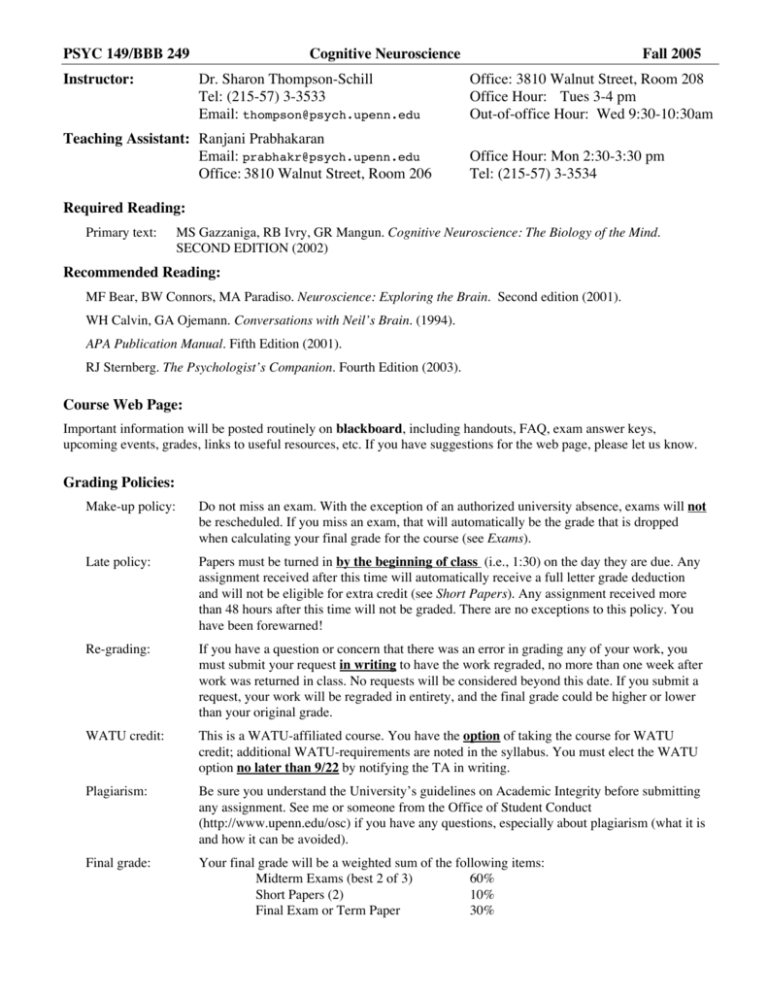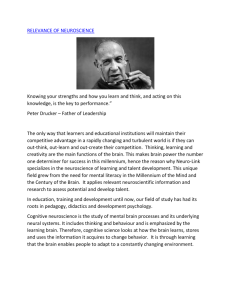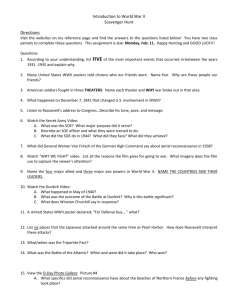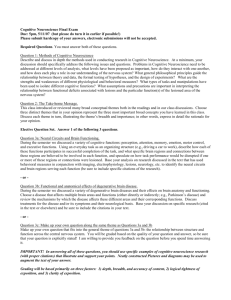PSYC 149/BBB 249 Cognitive Neuroscience Fall 2005
advertisement

PSYC 149/BBB 249 Instructor: Cognitive Neuroscience Dr. Sharon Thompson-Schill Tel: (215-57) 3-3533 Email: thompson@psych.upenn.edu Teaching Assistant: Ranjani Prabhakaran Email: prabhakr@psych.upenn.edu Office: 3810 Walnut Street, Room 206 Fall 2005 Office: 3810 Walnut Street, Room 208 Office Hour: Tues 3-4 pm Out-of-office Hour: Wed 9:30-10:30am Office Hour: Mon 2:30-3:30 pm Tel: (215-57) 3-3534 Required Reading: Primary text: MS Gazzaniga, RB Ivry, GR Mangun. Cognitive Neuroscience: The Biology of the Mind. SECOND EDITION (2002) Recommended Reading: MF Bear, BW Connors, MA Paradiso. Neuroscience: Exploring the Brain. Second edition (2001). WH Calvin, GA Ojemann. Conversations with Neil’s Brain. (1994). APA Publication Manual. Fifth Edition (2001). RJ Sternberg. The Psychologist’s Companion. Fourth Edition (2003). Course Web Page: Important information will be posted routinely on blackboard, including handouts, FAQ, exam answer keys, upcoming events, grades, links to useful resources, etc. If you have suggestions for the web page, please let us know. Grading Policies: Make-up policy: Do not miss an exam. With the exception of an authorized university absence, exams will not be rescheduled. If you miss an exam, that will automatically be the grade that is dropped when calculating your final grade for the course (see Exams). Late policy: Papers must be turned in by the beginning of class (i.e., 1:30) on the day they are due. Any assignment received after this time will automatically receive a full letter grade deduction and will not be eligible for extra credit (see Short Papers). Any assignment received more than 48 hours after this time will not be graded. There are no exceptions to this policy. You have been forewarned! Re-grading: If you have a question or concern that there was an error in grading any of your work, you must submit your request in writing to have the work regraded, no more than one week after work was returned in class. No requests will be considered beyond this date. If you submit a request, your work will be regraded in entirety, and the final grade could be higher or lower than your original grade. WATU credit: This is a WATU-affiliated course. You have the option of taking the course for WATU credit; additional WATU-requirements are noted in the syllabus. You must elect the WATU option no later than 9/22 by notifying the TA in writing. Plagiarism: Be sure you understand the University’s guidelines on Academic Integrity before submitting any assignment. See me or someone from the Office of Student Conduct (http://www.upenn.edu/osc) if you have any questions, especially about plagiarism (what it is and how it can be avoided). Final grade: Your final grade will be a weighted sum of the following items: Midterm Exams (best 2 of 3) 60% Short Papers (2) 10% Final Exam or Term Paper 30% PSYC 149/BBB 249 Cognitive Neuroscience Fall 2005 Schedule at a Glance Week 1 Date Lecture Topic Deadlines Recitation Topic (Mon 7pm) Sep 8 Introduction [1] 2 Sep 13 Sep 15 Neurophysiology [2] Methods [4] 3 Sep 20 Sep 22 Methods [4] Perception [5] 4 Sep 27 Sep 29 Perception [5] Higher visual functions [6] 5 Oct 4 Oct 6 Rosh Hashanah - No class Exam 1 6 Oct 11 Oct 13 Object/Face Recognition [6] Attention [7] 7 Oct 18 Oct 20 Fall Break – No class 8 Oct 25 Oct 27 Memory [8] Memory [8] 9 Nov 1 Nov 3 Working Memory [12] Exam 2 Review Session for Exam 2 10 Nov 8 Nov 10 Executive Control [12] Language [9] Short Paper due Writing Tutorial (WATU req’d) 11 Nov 15 Nov 17 Language [9] Reading Short Paper due 12 Nov 22 Nov 24 Consciousness [16] Thanksgiving – No class 13 Nov 29 Dec 1 Development/Plasticity [15] Development/Plasticity [15] 14 Dec 6 Dec 8 Attention [7] Recap Exam 3 Basic Science Review WATU enrollment deadline Neuroanatomy Lab [3] ** in Stemmler 102C** WATU topic due Research Tutorial (WATU req’d) Review Session for Exam 1 Short Paper due Short Paper due WATU reading list due Short Paper due WATU term paper draft due Short Paper due Education/Career Planning Fall Break Journal Club Journal Club TBA No recitation Review Session for Exam 3 PSYC 149/BBB 249 Cognitive Neuroscience Fall 2005 Short Papers The purpose of the Short Papers is to gain experience reading and critically evaluating primary references in the field of cognitive neuroscience. For each Short Paper, you must select two related primary (empirical) papers that fall under the assigned topic within the field of cognitive neuroscience. (If you aren’t sure whether the topic encompasses your choices, check with the TA first.) A good test of whether they are related is that one probably will cite the other one. Both papers should be no older than 1990 (unless you get my permission). The Short Paper should contain the following three elements: (i) an introduction of the problem or issue that the two papers address; (ii) for each study, a brief summary of the methods and most significant findings, as well as any shortcomings or limitations; (iii) an integration of the two findings. Be sure to explain the relation of the findings to each other (does one finding elaborate or build on a prediction of another; are the findings in disagreement, and if so, which is more convincing; if different methodologies are used, what unique contributions are made to the question by each?) as well as to the problem they address. Sample Short Papers are available to download from the course web page. You will have six opportunities to submit a Short Paper. You are only required to submit two of these assignments: you must submit one Short Paper from Group A and one Short paper from Group B (see lists below). Each Short Paper will be worth 5% of your final grade. In addition, you have the option of submitting one additional Short Paper to earn extra credit; this could add an additional 5% towards your final grade. The extra Short Paper can be from either Group A or B. The Short Paper may not exceed 1000 words (about 3-4 double-spaced pages). Note the total word count somewhere on your paper. Put your name on a separate cover sheet but not on the other pages of the paper (so you are anonymous when we are grading). Along with your paper, you should attach a copy of each article you are reviewing. Your paper may include additional references (it is a good idea!) but you should attach only the two articles that are the focus of your paper. The topics and due dates (by the beginning of class) for the Short Papers are as follows: Group A: Object/Face Recognition Oct 13 Attention/Neglect Oct 20 Memory Oct 27 Group B: Executive Control/Frontal Lobes Language Neural Development/Plasticity Nov 10 Nov 17 Dec 1 You can substitute a paper reporting on a Learning Outside the Classroom event one time by turning in that report instead of a Short Paper on any one of the above dates (see description later in syllabus). WATU students: You must submit two Short Papers. You can submit an LOTC report for a third (extracredit) paper, but an LOTC report may not take the place of one of your two required Short Papers. Checklist for Short Paper submission: 1. Do you have two related, empirical papers about the assigned topic published after 1990? 2. Have you included a full APA-style citation for each paper and a copy of each paper? 3. Have you included all three elements of the assignment, described above? 4. Is your name on a separate cover sheet only? 5. Is your word count (≤ 1000 words) noted somewhere in the paper (e.g., on the cover sheet)? PSYC 149/BBB 249 Cognitive Neuroscience Fall 2005 Term Paper (WATU students only) The purpose of the Term Paper is to gain in-depth knowledge about a particular subject area in the field of cognitive neuroscience and to develop your writing skills in organizing and synthesizing a large body of research, critically evaluating empirical and theoretical arguments, and expressing scientific ideas clearly. You have the option of submitting a term paper instead of taking the final exam by enrolling in the course for WATU credit. You must inform us of your intention to do so by September 22. After this date, you do not have the WATU option. However, if you sign up for WATU and change your mind or fail to meet the WATU requirements (see final page), you always retain the option of taking the final exam. For your Term Paper, you must select some topic in the field of cognitive neuroscience that is of interest to you, and for which there is a sufficient literature to digest for your paper. You should read a number of secondary and primary references about this topic. Your paper should include a clear explanation of the problem of interest and a critical analysis of the current research findings in this area. The Term Paper must include the following components: (i) The paper must begin with an abstract that summarizes your research in no more than 200 words. (ii) The text of the paper should be around 12 pages and absolutely no longer than 5000 words (about 20 pages). (iii) The paper must end with a complete bibliography of work cited throughout the paper. You must include at least 10 primary references (i.e., empirical research studies), in addition to any secondary references (i.e., review papers) that you read. You should be clear to distinguish your ideas from ideas presented by other people, and follow APA format for citing references. You may find it helpful to pick an area in which there is some controversy; in your paper you could present the relevant evidence for each side of the debate and provide your evaluation of which evidence is most compelling. The following are examples of topics, but this is by no means an exhaustive list: (i) Are faces a special class of objects? (ii) Is semantic knowledge organized according to category or modality? (iii) Are there separate implicit and explicit memory systems? (iv) What is the relevant reference frame in neglect? (v) How homogeneous are the functions of prefrontal cortex? (vi) What is the best way to describe the specializations of the left and right hemispheres? You may also choose to expand one of your Short Papers into a longer, more in-depth analysis of a topic. There is a series of assignments related to the term paper that you must complete: Sep 29 Topic due: Brief summary (approx. 200 word) of proposed paper topic, including descriptions of at least 2 references. You will get advice on how to proceed, what references to start with, and other suggestions. (5%) Oct 25 Annotated reading list due: List of 10 references with 1-2 sentence description of main point of each article. You will get feedback on areas you may have overlooked. (10%) Nov 22 Term paper draft due: A complete draft of your term paper, including abstract and reference list. Review the late policy carefully, and make sure you have enough toner in your printer, a back-up copy of your document, no vacation plans for that week, etc. etc. well in advance of this deadline! You will get feedback on how to improve your paper. After this date you must schedule a writing conference to discuss your paper. (45%) Dec 15 (2 pm) Revision of term paper due: You should respond to suggestions for improvements to your first draft and incorporate additional research as advised. (40%) PSYC 149/BBB 249 Cognitive Neuroscience Fall 2005 Exams The purpose of the Midterm and Final Exams is to assess basic factual knowledge of topics covered in lectures and readings, to review critical concepts and theories that are important in the field of Cognitive Neuroscience, and to challenge you to think deeply about ideas presented in class. In addition, the Final Exam will also require you to synthesize information across diverse areas and perhaps think about topics in novel ways. There are three midterm exams scheduled during the semester. Each of these exams will be administered during the regular class time, and should last approximately 45 minutes (although you will be allowed to use the entire class time). Two of these exams will contribute a total of 60% towards your final grade (30% each); the third exam score – with the lowest grade – will be dropped. If you are happy with your first two exam scores, you do not have to take the third exam. The exams are scheduled as follows: Exam 1 Exam 2 Exam 3 Oct 6 Nov 3 Dec 8 Lectures from Sep 8 – Sep 29; Lab on Sep 19, Chapters 1-5, part of 6 Lectures from Oct 11 – Oct 27, Chapters 6-8 Lectures from Nov 1, Nov 8 – Dec 1, Chapters 9, 12, 15, 16 There are no make-up exams: With the exception of an authorized university absence, exams will not be rescheduled. If you miss an exam, that will automatically be the grade that is dropped when calculating your final grade for the course. Each exam will consist of three types of questions: (i) multiple choice questions designed to assess detailed knowledge presented either in lecture or in readings; (ii) short answer questions designed to address basic knowledge about topics presented both in lecture and in readings; (iii) essay questions designed to assess indepth knowledge and to integrate information across lectures or readings. Although the essay questions will be primarily graded based on content, clarity of expression and organization of ideas will not be ignored. A complete sample exam (and answer key) is available from the course web page. The final exam will be cumulative. It will last 2 hours, and will be worth 30% of your final grade. The final exam will follow the same general format as the exams, with multiple choice, short answer, and essay questions. The date of the final exam will be as set forth by the University. (As of this writing, the exam is tentatively scheduled for Thursday, December 15, from 12-2, but you should check this.) If you elect to take the course for WATU credit, you will submit a term paper in lieu of taking the final exam. PSYC 149/BBB 249 Cognitive Neuroscience Fall 2005 Learning Outside the Classroom There will be a number of opportunities to participate in events outside of class where you can see real, live cognitive neuroscience in action. These events will be posted on the course web page and in some instances will be announced in class or by email. These include: Patient case conferences. Medical charts and brain scans for new neurology cases are reviewed for research purposes. Case conferences take place at the hospital once a month (8 am on Sep 21, Oct 19, Nov 16) and require my permission to attend, due to space constraints. In past years, students have found these to be both interesting and informative; if you are interested, email me as early as possible to sign up. Colloquia/Seminar on topics relating to cognitive neuroscience. A number of groups on campus hold weekly or biweekly talks that may be related to topics we are discussing in class. Typically, these talks are given by leaders in the field of cognitive neuroscience. Attending a talk gives you an opportunity to hear the details of experiments that are only briefly described in your textbook or in lecture and to learn what is happening on the cutting edge of the field. Talks of interest may be held at: Center for Cognitive Neuroscience (CCN) – Mon 12:00 Institute for Research in Cognitive Science (IRCS) – Fri 12:00 Institute for Neurological Sciences (INS) – Wed 4:00 Brain and Language Group – Wed 10:00 Research participation. The Center for Cognitive Neuroscience has ongoing research projects, ranging from cognitive testing to fMRI scans. We are routinely looking for participants for these studies. Research participation opportunities will be posted on the course web site, along with information and eligibility requirements. (Certain studies have exclusionary conditions that may not permit all students to participate.) You are strongly encourage to take advantage of as many of these opportunities as possible to extend your learning outside the classroom. To give you even more encouragement, you can write a summary of the event you attended. A Learning Outside the Classroom report can be substituted for any one of the Short Papers. Events that qualify for this assignment will be noted on the course web page. If the event is not listed on the web site, you must get approval before writing the paper. If you have questions about what information to include in this report, please see me prior to submitting it Please note that you cannot submit two papers (i.e., one Short Paper and one Learning Outside the Classroom report) on the same day. Plan ahead. The due dates and length restrictions are the same as noted for the Short Papers. You can only substitute a Learning Outside the Classroom report one time during the semester, although you may participate in the above events as many times as you would like. WATU students: You must submit two Short Papers. You can submit an LOTC report for a third (extracredit) paper, but an LOTC report may not take the place of one of your two required Short Papers. If you have any questions, please ask! PSYC 149/BBB 249 Cognitive Neuroscience Fall 2005 Recitations You should be enrolled for both a lecture and a recitation section of this course. Unlike the lectures, which are required, the recitations sections are optional but highly recommended. There are several types of activities that will occur at the recitation (dates are as noted on the schedule): Neuroanatomy Lab. On Sept 19, a neuroanatomy lecture and lab will be held (in Stemmler 102C). This is material that will be covered on exams; it can all be found in the text, but all students are strongly encouraged to attend. Human specimens will be available for inspection, but handling of brain tissue is not required. If you are uncomfortable, please talk to us prior to the lab. Attendance at this session is required. Review Sessions. There are three scheduled review sessions, on the Monday before each exam. The review sessions will be run by the Teaching Assistant and will be loosely structured in a question-answer format. They will begin at the scheduled time of 7pm, but unlike other recitation sessions, they may occasionally run for 2 hours. Attendance at these sessions is optional and is open to everyone. Research and Writing Tutorials. There are two tutorials intended to assist you with writing assignments. These tutorials will be run by the Writing Fellows. On September 26, all students are invited to attend (and WATU students are required to attend) a general discussion of scientific writing, with an emphasis on how to choose a topic, conduct a literature search, and locate relevant articles. These topics will be useful in the preparation of both Short Papers and the Term Paper. On November 7, WATU students are required to attend a session focused on the writing process, with an emphasis on paper organization, scientific style, and common pitfalls to avoid. This session is open to all students but is aimed at helping WATU students improve their term paper drafts. Attendance at these sessions is required by WATU students but is open to everyone. Journal Clubs. There will be two “journal club” sessions, during which a small group of students will gather during the recitation session to have an in-depth discussion with the Teaching Assistant about an empirical paper that has been briefly discussed in a recent lecture. Students must sign-up to attend the journal club in advance, and spaces will be limited to approximately 15 students. The article and room location will be announced in advance. The selected paper will pertain directly to material being discussed for that course unit. Students who attend the Journal Club may use the assigned article as one of their two required articles for the immediately following Short Paper deadline. Attendance at these sessions is optional and is limited to the first 15 students who sign up (by email to TA). Educational/Career Planning. There will be one recitation session devoted to a discussion with the Professor (and a small panel of graduate and/or medical students) about education and career planning in fields related to psychology and neuroscience. This is conveniently scheduled during advanced registration, and will include a discussion of related coursework at Penn and advice on getting involved in research here. Other topics will include: different career paths (PhD, MD, etc.), how to choose and get accepted into the right graduate program, and other career planning issues (e.g., combining work and family). Students must sign-up to attend this information session in advance, and spaces will be limited to approximately 25 students. If there is sufficient demand, there will be second session scheduled (on the same topic) on another day and time. Attendance at this session is optional and is limited to the first 25 students who sign up (by email to TA). PSYC 149/BBB 249 Cognitive Neuroscience Fall 2005 Writing Across the University (WATU) Requirements This is a WATU-affiliated course. You have the option of taking this course in partial fulfillment of the University Writing Requirement. (For more information about the WATU program, visit the Writing Program’s web page at http://www.sas.upenn.edu/writing/index.html) You must decide if you are going to complete the WATU portion of the course by September 23. Please review the WATU requirements summarized on this handout, and return the attached enrollment form no later than September 22. After this date, you do not have the WATU option; if we do not hear from you, we will assume you have elected not to complete the WATU requirements. However, if you sign up for WATU and change your mind or fail to meet the WATU requirements, you always retain the option of taking the final exam. Additional WATU requirements: 1. You must complete all four stages of the term paper assignment by the assigned deadline: (i) topic, (ii) annotated reading list, (iii) draft, and (iv) revision. 2. You must attend the Research Tutorial and Writing Tutorial recitation sessions (Sept 26; Nov 7). 3. You must have at least two individual conferences with your Writing Fellow. 4. You must submit at least two Short Papers; you may still submit a Learning Outside the Classroom report as a third paper for extra credit. (That is, you may not submit only one Short Paper and one LOTC report.) You are strongly encouraged to write one of your Short Papers on your term paper topic. PSYC 149/BBB 249 Cognitive Neuroscience Fall 2005 Writing Across the University (WATU) Enrollment Form Name: (Please print legibly!) Email: ID: I have read and understood the following additional requirements for the WATU component of the course: 1. I will complete all four stages of the term paper assignment by the assigned deadline: (i) topic, (ii) annotated reading list, (iii) draft, and (iv) revision. 2. I will attend the Research Tutorial and Writing Tutorial recitation sessions (Sept 26; Nov 7). 3. I will have at least two individual conferences with the Writing Fellow. 4. I will submit at least two Short Papers. I understand that I can only submit a Learning Outside the Classroom report for a third (extra-credit) paper, and I know that one of my two Short Papers can relate to my term paper topic. I understand that if I fail to complete any of the above requirements, I will be automatically withdrawn from the WATU component of the course, and I will complete the standard course requirements (e.g., Final Exam) as described in the syllabus. Signature: Return this form no later than September 22.





